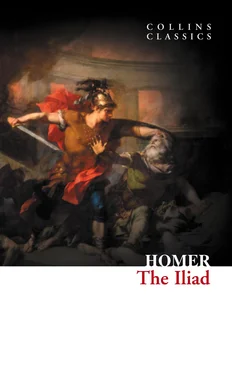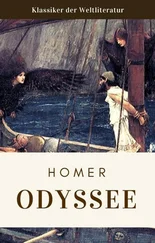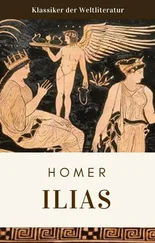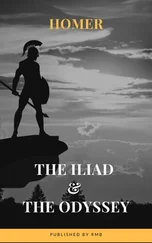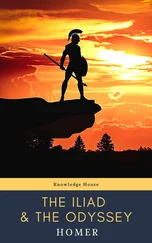Far, far from Ilion should thy vessels sail,
And thou, from camps remote, the danger shun
Which now, alas! too nearly threats my son.
Yet (what I can) to move thy suit I’ll go
To great Olympus crown’d with fleecy snow.
Meantime, secure within thy ships, from far
Behold the field, not mingle in the war.
The sire of gods and all the ethereal train,
On the warm limits of the farthest main,
Now mix with mortals, nor disdain to grace
The feasts of Æthiopia’s blameless race,
Twelve days the powers indulge the genial rite,
Returning with the twelfth revolving light.
Then will I mount the brazen dome, and move
The high tribunal of immortal Jove.”
The goddess spoke: the rolling waves unclose;
Then down the steep she plunged from whence she rose,
And left him sorrowing on the lonely coast,
In wild resentment for the fair he lost.
In Chrysa’s port now sage Ulysses rode;
Beneath the deck the destined victims stow’d:
The sails they furl’d, they lash the mast aside,
And dropp’d their anchors, and the pinnace tied.
Next on the shore their hecatomb they land;
Chryseis last descending on the strand.
Her, thus returning from the furrow’d main,
Ulysses led to Phoebus’ sacred fane;
Where at his solemn altar, as the maid
He gave to Chryses, thus the hero said:
“Hail, reverend priest! to Phoebus’ awful dome
A suppliant I from great Atrides come:
Unransom’d, here receive the spotless fair;
Accept the hecatomb the Greeks prepare;
And may thy god who scatters darts around,
Atoned by sacrifice, desist to wound.”
At this, the sire embraced the maid again,
So sadly lost, so lately sought in vain.
Then near the altar of the darting king,
Disposed in rank their hecatomb they bring;
With water purify their hands, and take
The sacred offering of the salted cake;
While thus with arms devoutly raised in air,
And solemn voice, the priest directs his prayer:
“God of the silver bow, thy ear incline,
Whose power incircles Cilla the divine;
Whose sacred eye thy Tenedos surveys,
And gilds fair Chrysa with distinguish’d rays!
If, fired to vengeance at thy priest’s request,
Thy direful darts inflict the raging pest:
Once more attend! avert the wasteful woe,
And smile propitious, and unbend thy bow.”
So Chryses pray’d. Apollo heard his prayer:
And now the Greeks their hecatomb prepare;
Between their horns the salted barley threw,
And, with their heads to heaven, the victims slew:
The limbs they sever from the inclosing hide;
The thighs, selected to the gods, divide:
On these, in double cauls involved with art,
The choicest morsels lay from every part.
The priest himself before his altar stands,
And burns the offering with his holy hands.
Pours the black wine, and sees the flames aspire;
The youth with instruments surround the fire:
The thighs thus sacrificed, and entrails dress’d,
The assistants part, transfix, and roast the rest:
Then spread the tables, the repast prepare;
Each takes his seat, and each receives his share.
When now the rage of hunger was repress’d,
With pure libations they conclude the feast;
The youths with wine the copious goblets crown’d,
And, pleased, dispense the flowing bowls around;
With hymns divine the joyous banquet ends,
The paeans lengthen’d till the sun descends:
The Greeks, restored, the grateful notes prolong;
Apollo listens, and approves the song.
’Twas night; the chiefs beside their vessel lie,
Till rosy morn had purpled o’er the sky:
Then launch, and hoist the mast: indulgent gales,
Supplied by Phoebus, fill the swelling sails;
The milk-white canvas bellying as they blow,
The parted ocean foams and roars below:
Above the bounding billows swift they flew,
Till now the Grecian camp appear’d in view.
Far on the beach they haul their bark to land,
(The crooked keel divides the yellow sand,)
Then part, where stretch’d along the winding bay,
The ships and tents in mingled prospect lay.
But raging still, amidst his navy sat
The stern Achilles, stedfast in his hate;
Nor mix’d in combat, nor in council join’d;
But wasting cares lay heavy on his mind:
In his black thoughts revenge and slaughter roll,
And scenes of blood rise dreadful in his soul.
Twelve days were past, and now the dawning light
The gods had summon’d to the Olympian height:
Jove, first ascending from the watery bowers,
Leads the long order of ethereal powers.
When, like the morning-mist in early day,
Rose from the flood the daughter of the sea:
And to the seats divine her flight address’d.
There, far apart, and high above the rest,
The thunderer sat; where old Olympus shrouds
His hundred heads in heaven, and props the clouds.
Suppliant the goddess stood: one hand she placed
Beneath his beard, and one his knees embraced.
“If e’er, O father of the gods! (she said)
My words could please thee, or my actions aid,
Some marks of honour on my son bestow,
And pay in glory what in life you owe.
Fame is at least by heavenly promise due
To life so short, and now dishonour’d too.
Avenge this wrong, O ever just and wise!
Let Greece be humbled, and the Trojans rise;
Till the proud king and all the Achaian race
Shall heap with honours him they now disgrace.”
Thus Thetis spoke; but Jove in silence held
The sacred counsels of his breast conceal’d.
Not so repulsed, the goddess closer press’d,
Still grasp’d his knees, and urged the dear request.
“O sire of gods and men! thy suppliant hear;
Refuse, or grant; for what has Jove to fear?
Or oh! declare, of all the powers above,
Is wretched Thetis least the care of Jove?”
She said; and, sighing, thus the god replies,
Who rolls the thunder o’er the vaulted skies:
“What hast thou ask’d? ah, why should Jove engage
In foreign contests and domestic rage,
The gods’ complaints, and Juno’s fierce alarms,
While I, too partial, aid the Trojan arms?
Go, lest the haughty partner of my sway
With jealous eyes thy close access survey;
But part in peace, secure thy prayer is sped:
Witness the sacred honours of our head,
The nod that ratifies the will divine,
The faithful, fix’d, irrevocable sign;
This seals thy suit, and this fulfils thy vows—”
He spoke, and awful bends his sable brows,
Shakes his ambrosial curls, and gives the nod,
The stamp of fate and sanction of the god:
High heaven with trembling the dread signal took,
And all Olympus to the centre shook.
Swift to the seas profound the goddess flies,
Jove to his starry mansions in the skies.
The shining synod of the immortals wait
The coming god, and from their thrones of state
Arising silent, wrapp’d in holy fear,
Before the majesty of heaven appear.
Trembling they stand, while Jove assumes the throne,
All, but the god’s imperious queen alone:
Late had she view’d the silver-footed dame,
And all her passions kindled into flame.
“Say, artful manager of heaven (she cries),
Who now partakes the secrets of the skies?
Thy Juno knows not the decrees of fate,
In vain the partner of imperial state.
What favourite goddess then those cares divides,
Which Jove in prudence from his consort hides?”
To this the thunderer: “Seek not thou to find
Читать дальше
